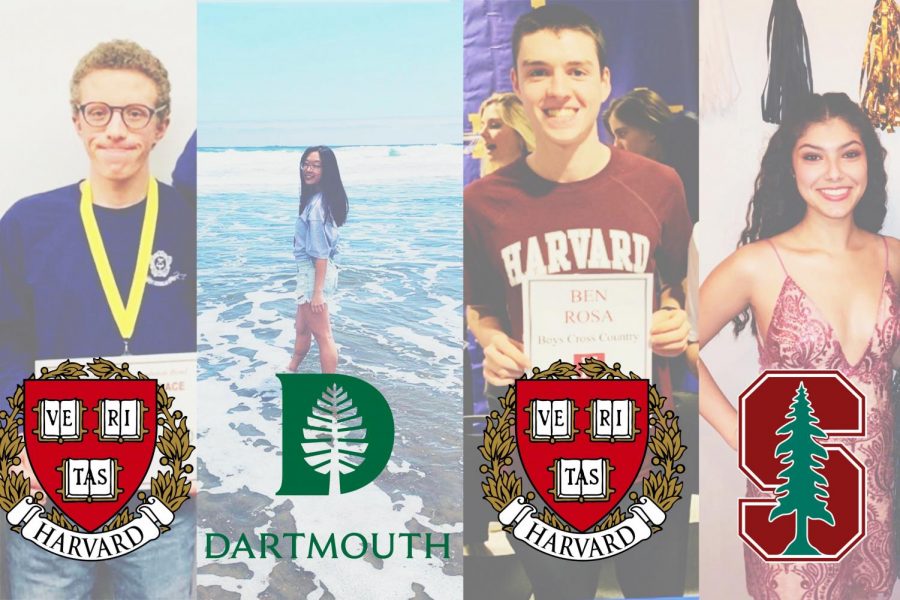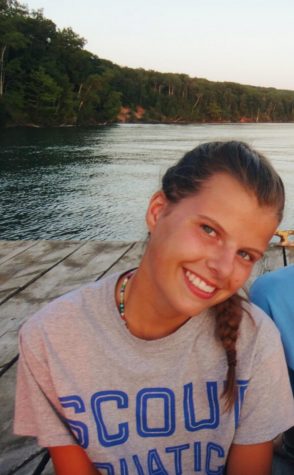Stories of Class of 2020 Students Accepted Into Selective Schools
Graphic by Madeleine van Esbroeck
From Left to Right: Casey Murray, Elaina Lee, Ben Rosa, Maliha Yousef — members of an impressively large group of LFHS students headed to selective schools next year.
April 6, 2020
The graduating class of 2020, to say the least, has taken us by surprise when finding out what their future will entail for the next four years.
Many people have heard back from their dream schools, some of those being the long-desired Ivies or very elite and selective schools. Getting into an elite school is a huge accomplishment for people who have had their minds set on a specific school for the majority of their education.
Senior Maliha Yousuf said that her reaction to her admittance into Stanford University was so overwhelming that she immediately started crying. While she said the moment itself was great, the week leading up to it wasn’t so much.
“The week before I had been rejected from what I thought was my dream school and it was really difficult for me to wrap my head around…. whenever I had pictured myself at college I was there, so then to know that was where I wasn’t going to end up was devastating. I had also fallen sick and was trying to keep up with all of my work while I was in and out of school,” she said. “The week leading up to my acceptance was absolutely the worst.”
It’s safe to say though, that the bad week prior definitely redeemed itself in the end.
It’s pretty easy to assume that they have spent quite a bit of time trying to nail every test, perfect their ACT and SAT scores, all while trying to balance extracurriculars to achieve the school of their dreams. While most of that is true, the LFHS students who were accepted into an Ivy league school claimed it went beyond academics.
“I feel like when you are applying to extremely selective schools, grades and test scores are like the qualifications that you need but just because you have them doesn’t mean you will get in,” Yousuf said.
Senior Elaina Lee, who is attending Dartmouth in the fall, said that she believes “hard work pays off” and while she feels her test scores played a part in her acceptance it wasn’t everything. She was heavily involved in our school and took advantage of all the extracurriculars it had to offer. Participating in the tennis team, badminton team, and Big 2 Little all four years of High school. She was also involved in Chinese club sophomore all the way to senior year, and the Asian Pacific American club as a junior and senior.
Senior Casey Murray, who is going to be attending Harvard, said that he felt the academics and extracurriculars played an equal part in his acceptance.
Murray participated in a variety of activities within his High school years. “I’m currently a co-Secretary General of the Model United Nations team, which essentially means that I run meetings and plan out topics of debate. I write and edit for Young Idea, the student literary magazine, and play for the Varsity Scholastic Bowl team. I sail on the LFHS Sailing team and serve as one of the captains” he said.
It doesn’t stop there. He is also an Eagle Scout in Lake Bluff Troop 42 and a community representative on the School Board’s Finance and Ops committee. Clearly Casey has pursued a list of hobbies — all of which interest him.
Senior Ben Rosa, who made the Track and Cross Country team for Harvard, was involved in “Track, Cross Country, Boy Scouts and Latin Club” throughout his high school experience.
Stanford-admitted Maliha Yousuf is the definition of an involved student. She “heavily participated” in the theater and choir programs all four years and the talent show for 3. Learning leadership young, she became the co-leader for the Human Rights club her sophomore year and later president junior and senior year. Similar to Lee, Yousuf was also involved in the Asian Pacific American club; A club dedicated to educating people about the Asian-Pacific American culture.
She was also a member of the National Youth Civic Collaboratory with Citizen’s University which “was a program about teaching youth how to become more civically engaged,” she said.
She highlighted her academic excellence in the National Honor Society and spent two summers as the communications intern for Karam Foundation, an organization that helps Syrian refugees help themselves, and volunteers there throughout the year when possible.
Although Stanford isn’t Ivy League, it doesn’t mean it’s any less difficult to get into with a 4.7% acceptance rate. According to the Stanford admissions, 47,451 people applied in 2018 but only 2,071 were admitted and 1,706 were enrolled, making this school extremely selective. Harvard ranks in with a 5.2% acceptance rate with 43,330 applicants, admitting only 2,009 and enrolling 1,650.
College counselor Megan Miles says that while there is a “substantial percentage increase” every child is different, and you can’t compare each class since many colleges accept each student for different reasons. Nonetheless, she praises the group
“They are a very accomplished class in terms of what they’ve done and we did have a good year in terms of people getting into those schools,” Miles said.
This year has proven to have the most applicants to Harvard, which has been steadily growing since 2015. While in 2015 only ten students applied, there were 18 hopeful people from the Class of 2020 awaiting acceptance.
“I visited Duke, Michigan and Harvard. I also was considering a visit to MIT, but Harvard just had the best combination of everything,” Rosa, who is considering a major in computer science, said.
After being blown away at how much these particular students balance, the idea of Interest was something they all had in common. That word seems to be key to these students’ success. When trying to pinpoint what exactly you want on your transcript every person I interviewed said to go after things you are interested in.
“You should follow what you’re passionate about,” Senior Elaina Lee said. “In all honesty, part of getting into the top schools is just luck. Even though the pressure of college led me to get involved, I chose clubs and sports that I genuinely enjoy, not necessarily the ones that I assumed would look the best.”
Casey Murray supported this notion, encouraging students to be led by their interests leading up to college.
“In four words: be who you are. Let your interests define you, don’t define your interests because you think they’ll look good on your college application,” he said.
It’s important to remember that while having the grades is great, there is so much more to life beyond the textbook that defines a person.
“Colleges admit people who are interesting and interested in the world around them; the two go hand in hand. Be curious. Have an open mind. Dive down Wikipedia rabbit holes. There is so much to learn about the world, that’s why college exists,” Murray added.
Rosa’s advice for people trying to decide what clubs/activities they want on their transcript was to “Just stay well rounded, don’t focus on success in one thing, rather multiple areas.” He feels his acceptance was a combination of his grades and test scores but also his times that sealed the deal. Adding that it’s important to be successful in some other area beyond the scores since Harvard is looking for diverse, interesting people who are accomplished in a variety of things.
Rosa’s acceptance was slightly different to other students, since at first he didn’t consider the possibility of running on both the track and cross country team for Harvard, but once his times came rolling in he and his coaches knew that he had the possibility of running for a division one team.
“I knew I had the coach’s confidence and I just had to wait for admission,” Rosa said. Finding out about his acceptance a few weeks earlier than the typical student, he said he wasn’t as shocked as most people would’ve been since he felt confident about the combination of his academics and outstanding times.
Yousef said that her acceptance built up to be a variety of things but what made her stand out most she felt were her extracurriculars, her arts portfolio, and her essays. “When applying to selective schools, grades and test scores are like the qualifications that you need,” she said. “But just because you have them doesn’t mean you will get in.”
Her advice for students who are looking to apply at particular schools was to “Do things in high school that you are genuinely passionate about because when it finally comes time to write the essays your passion will shine through,” she said.
Bringing it back to the actual process of applying- where you’ll be able to share everything that you’ve accomplished- Maliha said that it’s best not to apply to too many schools, start your common app and applications early to and to have your applications ready to go before you find out about your ED, ERA, EA just in case it doesn’t work out.
When writing those college essays Murray’s advice was to not start your college essays with rhetorical questions. “Don’t try it. You will seem stupid and you will be laughed at,” he said.
Getting accepted into college is an accomplishment for anyone, especially after the rigorous application process and the years leading up to it can all be very emotional. Lee’s reaction to getting accepted she said was unreal.
“I was shocked and I still am,” she said.
Last but not forgotten, it’s important to remember to apply to schools that you would actually be happy at.
“Don’t just apply because they are a ‘good school’ or because your parents told you to,” Yousef said. “At the end of the day it is your future and you should be able to have a say in that.”







